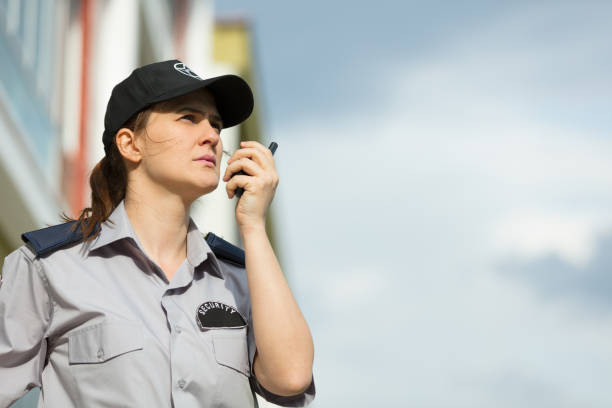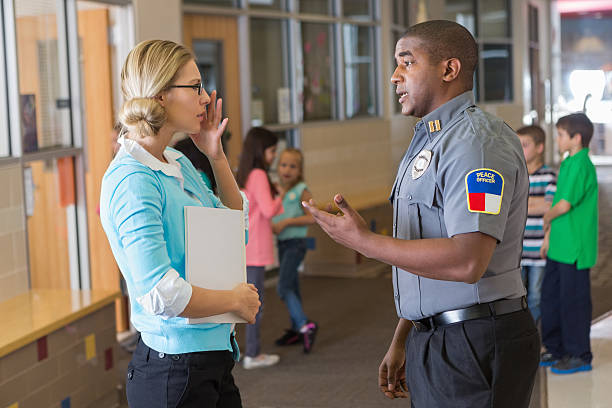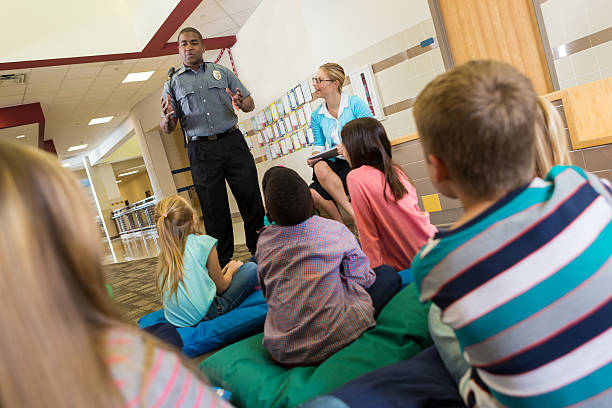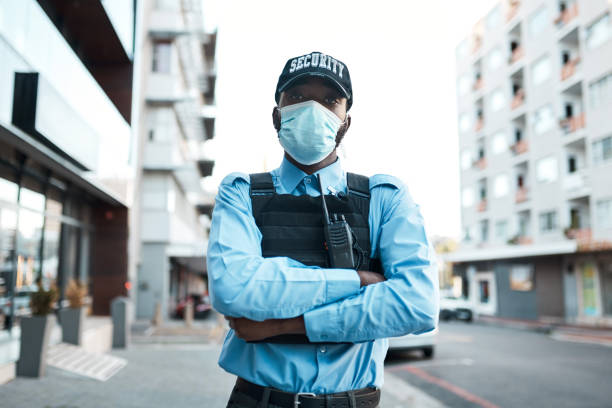Learn About Being a Security Officer
Security officers are on duty 24/7 to protect against theft and vandalism, deter crime through deterrence, and provide emergency assistance. In addition to maintaining order, they often act as first responders in emergency situations. Security officers may be assigned to patrol areas such as parking lots or lobbies of commercial buildings or government facilities. They may also check bags and other belongings at entrances into these locations. Some security officers work directly for the building owner while others work for an outside company that contracts with an employer such as a hotel chain or retail store chain.
Monitor security systems.

Security Officer
Monitoring security systems is a high priority for security officers. They need to make sure that the security systems are operating properly and that there are no intrusions or other problems with them. Security officers will often use monitoring equipment like:
- CCTV cameras
- Access control devices (e.g., turnstiles, keypads)
- Motion detectors
Security officer requirements
As a security officer, you’ll be responsible for the safety of the people and property at your location. To become an effective security officer, you’ll need to meet some requirements:
- High school diploma or GED
- 18 years old
- Eligible to carry a firearm (if required)
- Eligible to obtain a security guard license (if required) – no felony convictions
In addition to meeting these basic qualifications, there are some additional things that can help you land this job: It’s important that you’re able to pass drug tests and criminal background checks before being hired as well.
Security officer work environment

What does a security officer do?
Security officers work in a variety of environments. They work in retail stores, schools, and office buildings. Security officers can be found at any type of store or business that requires protection for their customers and employees. There are even security officers who work at amusement parks to keep the patrons safe from harm while they are enjoying themselves on rides and attractions.
Security officers must also be prepared for all types of weather conditions as well as terrain and environmental conditions during their shift whether it’s hot or cold outside, raining or snowing, windy or calm; there may even be times when you have to deal with smoke from fires nearby your location which requires extra caution so you don’t inhale any harmful chemicals into your lungs which could lead to serious health problems later on down the road such as cancerous tumors if not treated properly right away after being exposed long enough without medication intervention treatment plan being administered right away once symptoms begin showing up first signs occur everyday life goes on around us every minute hour day week month year decade decade decade decades century centuries millennia infinity!
How to become a security officer?
If you want to become a security officer, start by contacting your local law enforcement agency. You’ll need to be at least 18 years of age, have a high school diploma or equivalent, possess a valid driver’s license, and pass a background check. Once this step is complete — which can take weeks — you may be called in for an interview. During this meeting, you will likely be asked about your qualifications and why you want to work as a security guard. Assuming that goes well, the next step will be taking some basic tests: physical exams (including drug tests) as well as written exams demonstrating knowledge in areas such as criminal laws related specifically to working as an armed guard or unarmed guard.
Security officer job description example

What does a security officer do?
As a security officer, you’ll be required to perform many different tasks. These responsibilities can include:
- Making sure that the building is secure and safe from intruders and theft
- Guarding assets and property
- Monitoring video surveillance systems for activity such as unauthorized access or theft
- Checking ID badges to verify that people are authorized to be in the building or on the premises
This job requires several skills that are necessary for success. In order to be considered for this position, you will need to have at least a high school diploma or GED equivalent. You should also have some experience working with others in law enforcement positions and/or military service since these positions require teamwork with other individuals who have different responsibilities than yours. Additionally, it’s important that you possess physical strength because there may be times when you need help moving heavy objects out of harm’s way while preventing damage from occurring due to improper handling by others who might not know what they’re doing without proper supervision being present during those instances where someone else needs assistance moving something heavy around within their workspace area but cannot do so themselves due only having one hand available at any given time instead of two hands available like everyone else has who does not require assistance moving anything (such as yourself).
Patrolling assigned areas.
You’ll be responsible for patrolling your assigned area. Patrolling is an important part of ensuring safety and security, so you’ll be doing this regularly. You should make sure that your patrol is systematic and covers the entire area you’re responsible for.
Maintaining inventory of security control equipment and supplies.
- Maintain a record of all security equipment and supplies.
- Keep track of all security equipment, including devices such as cameras, cell phones, radios, and even handguns.
Responding to security and safety hazards.
As a security officer, you’ll be responsible for responding to a variety of security and safety hazards. These incidents can include alarms and other types of alerts, such as fire alarms, medical emergencies, and requests for assistance from other security officers or members of the public.
You may also be required to investigate suspicious activity on the property and report any findings back to your supervisor.
Reporting intrusions and inadvertent entries into restricted areas.
As a security officer, you will be responsible for responding to alarms, fire alarms, medical emergencies, and other situations that are reported. You must respond immediately and take action as needed. In some cases, your job will include reporting intrusions into restricted areas or responding to suspicious persons who may be trespassing on the grounds of the building or facility where you work.
Responding to requests for assistance is another aspect of what security officer does as part of their daily duties. This could involve helping someone use an elevator when it breaks down or assisting with parking issues if there is not enough space available in one area due to construction projects taking place nearby. Security officers also provide information about company policies when asked by employees during their shifts on duty (which can sometimes take place overnight).
Security guards play a vital role in assuring the safety of our communities
As a community, you depend on security guards to keep you safe. They are often the first responders to medical emergencies and other dangerous situations. As a result, they play an important role in ensuring the safety of your community.
In addition to assisting with emergencies, security guards also provide protection against theft and other crimes that may occur on your property. They help keep you safe while you’re sleeping at night or when you’re away from home on vacation or business trips.
Security guards may also be called upon by local law enforcement agencies when they need assistance in performing their duties; this can include serving warrants, responding to calls for service, or patrolling neighborhoods after dark when there aren’t enough officers available due to staffing shortages (which happens more frequently than many people realize).
Conclusion
One of the biggest misconceptions about security guards is that they are only there to provide a presence and deter crime. However, the reality is that they often play a much more active role in preventing crimes from happening in the first place by patrolling their assigned areas and looking for anything suspicious. Security officers are also trained to respond quickly when they notice something out of place so if you see someone acting suspiciously, report it!

